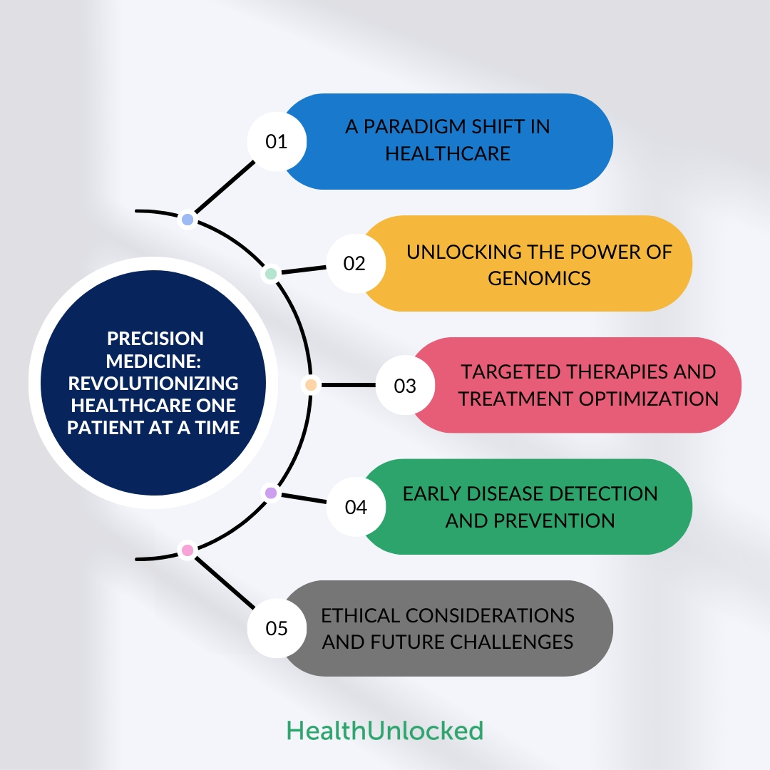In the realm of healthcare, the concept of precision medicine has emerged as a transformative approach to diagnosis, treatment, and prevention. By tailoring medical interventions to individual patients based on their unique genetic, environmental, and lifestyle factors, precision medicine holds the promise of revolutionizing healthcare. In this thought leadership article, we delve into the profound impact of precision medicine and explore how it is reshaping the landscape of healthcare.
A Paradigm Shift in Healthcare:
Precision medicine marks a paradigm shift from the traditional one-size-fits-all approach to a personalized, patient-centered model. Instead of relying solely on population-based treatment protocols, precision medicine harnesses the power of genomic information, biomarkers, and advanced technologies to precisely target the underlying mechanisms of diseases. This tailored approach enables healthcare providers to develop personalized treatment plans that are more effective, safer, and have fewer adverse effects.
Unlocking the Power of Genomics:
At the core of precision medicine lies genomics—the study of an individual's complete set of genes and their interactions. Advances in genomic sequencing technologies have made it possible to rapidly and cost-effectively analyze an individual's genetic makeup. This wealth of genetic information helps identify genetic variations associated with diseases, predict disease risk, and guide treatment decisions. By understanding the unique genetic profile of a patient, healthcare providers can optimize treatment strategies and deliver personalized care.
Targeted Therapies and Treatment Optimization:
Precision medicine has propelled the development of targeted therapies tailored to specific disease subtypes or patient characteristics. By identifying genetic mutations or biomarkers, healthcare providers can match patients with targeted therapies that have a higher likelihood of success. This approach has shown remarkable efficacy in various fields, such as oncology, where targeted therapies have revolutionized cancer treatment and improved patient outcomes. Precision medicine also enables treatment optimization, minimizing trial-and-error approaches and reducing the risk of adverse effects.
Early Disease Detection and Prevention:
One of the most significant advantages of precision medicine is its potential to detect diseases at an early stage, even before symptoms manifest. By combining genetic information with other patient data, healthcare providers can identify individuals at a higher risk of developing specific conditions and implement preventive measures accordingly. Early detection and intervention not only lead to more successful treatment outcomes but also contribute to overall cost savings in healthcare systems.
Ethical Considerations and Future Challenges:
While precision medicine holds immense promise, it also raises ethical considerations and challenges. Privacy and security of genetic information, access and affordability of genetic testing and therapies, equitable distribution of resources, and ensuring the inclusion of diverse populations are crucial aspects that need to be addressed. Collaboration among healthcare providers, researchers, policymakers, and patients is necessary to navigate these challenges and ensure that precision medicine benefits all individuals, regardless of socioeconomic status or background.
Precision medicine represents a groundbreaking approach that has the potential to transform healthcare by enabling tailored, patient-centered interventions. By leveraging genomic information, targeted therapies, and early disease detection, precision medicine aims to improve treatment outcomes, reduce adverse effects, and enhance overall patient well-being. However, it is essential to address ethical concerns, ensure accessibility and equity, and foster collaboration to fully unlock the potential of precision medicine. As we embark on this journey, the future of healthcare holds the promise of a more precise, personalized, and effective approach to medicine.
Had you heard of precision medicine before reading this post? Whether yes or no, please delve deeper into your experiences or knowledge of this area in the replies below!
